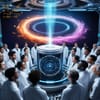Artificial intelligence (AI) is poised to revolutionize fundamental physics, potentially revealing insights into the universe's origins and ultimate fate. By analyzing vast datasets and identifying complex patterns, AI can accelerate discoveries in physics, particularly in areas like particle physics and cosmology.
AI's impact on physics is expected to be significant, as it can efficiently process large datasets, identify anomalies and patterns that might elude human researchers, and simulate complex physical systems. This can reduce computational time and improve accuracy, leading to new breakthroughs in our understanding of the universe.
The integration of AI in physics also raises important questions about the nature of scientific discovery and the role of human researchers. As AI becomes increasingly capable of performing tasks traditionally reserved for humans, it challenges traditional notions of scientific methodology.
In the context of fundamental physics, AI may help uncover new insights into the universe's evolution and ultimate fate. By analyzing large datasets and identifying complex patterns, AI can potentially reveal new information about the universe's origins, structure, and destiny.


